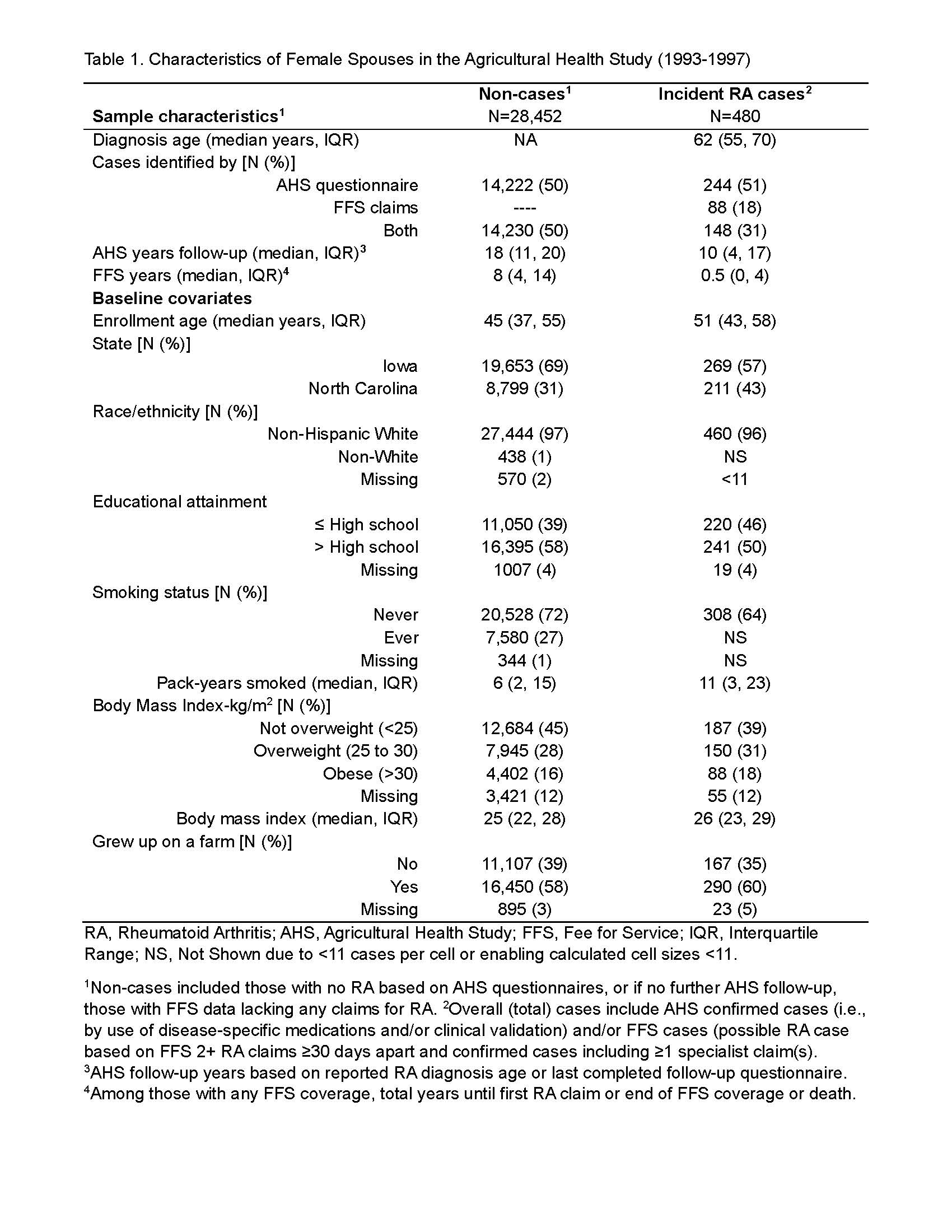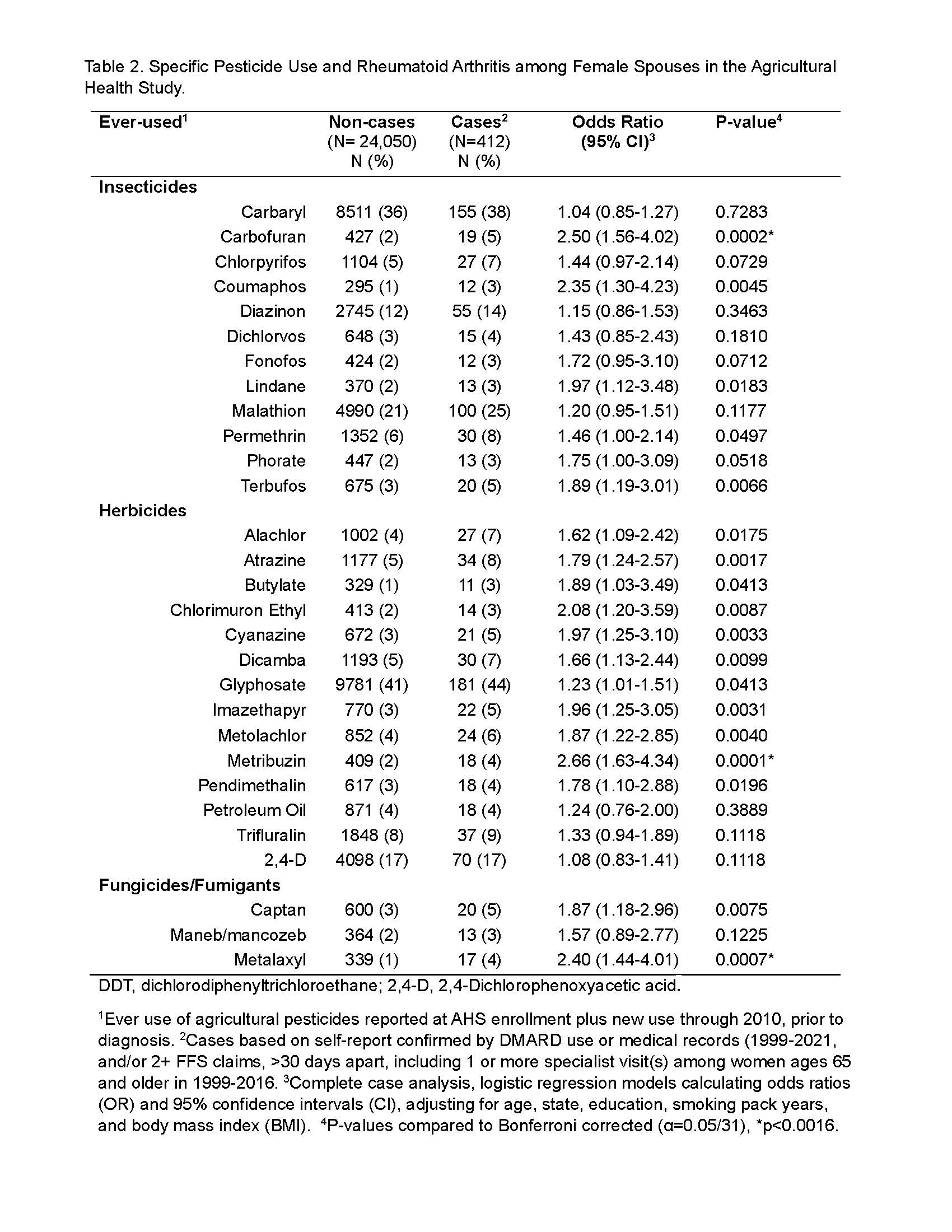Session Information
Session Type: Abstract Session
Session Time: 1:00PM-2:30PM
Background/Purpose:
Systemic autoimmune rheumatic diseases have been associated with farming exposures, but the role of pesticides has not been well studied. The Agricultural Health Study (AHS) cohort includes 32,345 spouses (99% female) of licensed pesticide applicators, who enrolled in 1993-1997 in North Carolina and Iowa, and completed up to 4 follow-up surveys through 2021. In a prior AHS study of rheumatoid arthritis (RA), including 123 incident cases (self-reported and medically confirmed) through 2010, RA was associated with use of any agricultural pesticides, the organochlorine insecticide dichlorodiphenyltrichloroethane (DDT), the herbicide glyphosate, and the fungicides maneb/mancozeb. Interpretation was limited by the small number of cases and lack of follow-up data on ~40% of enrolled spouses.
Methods: This current study included 10 more years of active follow-up, an expanded case identification, and updated exposure data up to 2010. Self-reported cases were confirmed by use of disease modifying anti-rheumatic drugs and medical records, mortality with RA, and Medicare fee-for-service (FFS) claims data for RA among those ages 65 years and older in 1999-2016 (i.e., ≥2 RA claims >30 days apart, including ≥1 specialist claim(s)). Non-cases had a negative self-report of RA by questionnaire and/or no FFS RA claims. We examined associations of RA with use of 31 pesticides with ≥11 exposed cases. Using logistic regression in a complete case analysis, we calculated odds ratios (OR) and 95% confidence intervals (CI), adjusting for age, state, race/ethnicity, education, pack-years smoking, and body mass index.
Results: We identified 480 incident cases (median diagnosis age 62 years, interquartile range 54-70) and 28,453 non-cases; most were non-Hispanic white (97% cases, 96% non-cases) and from Iowa (57% cases, 69% non-cases). Cases were older (median age 51 vs. 45 years non-cases) and reported more smoking pack-years at enrollment (Table 1). The most commonly reported pesticides were the insecticides, carbaryl (38% of cases vs. 36% non-cases) and malathion (25% vs. 21%), and the herbicides, glyphosate (44% vs. 41%) and 2,4-D (18% vs. 17%)(Table 2). In adjusted models, we confirmed RA associations with DDT (OR 1.91; 95%CI 1.31-2.77) and glyphosate (1.23;1.01-1.51), but not maneb/mancozeb (OR 1.57;0.89-2.77). New associations (ORs >1.8) were seen for several insecticides (lindane, coumaphos, terbufos, and carbofuran: ORs 1.89-2.50), herbicides (metolachlor, butylate, cyanazine, metribuzin, chlorimuron ethyl, and imazethapyr: ORs 1.87-2.66), and 2 fungicides (captan, and metalaxyl: ORs 1.87 and 2.22). After correcting for multiple testing (Bonferoni α=0.05/31=0.0016), RA associations with DDT, carbofuran, metribuzin, and metalaxyl remained statistically significant.
Conclusion: We found positive associations of multiple insecticides, herbicides, and fungicides with RA, but not all pesticides examined. Strong and significant ORs for several specific pesticides suggest a possible role in the development of RA among AHS female spouses. Planned analyses will consider patterns of pesticide use and related exposures, and potential modifiers, such as age and early life farm residence.
To cite this abstract in AMA style:
Parks C, Costenbader K, Beane Freeman L, Hofmann J, Sandler D. Pesticide Use and Incident Rheumatoid Arthritis Among Spouses in the Agricultural Health Study: An Updated Analysis [abstract]. Arthritis Rheumatol. 2024; 76 (suppl 9). https://acrabstracts.org/abstract/pesticide-use-and-incident-rheumatoid-arthritis-among-spouses-in-the-agricultural-health-study-an-updated-analysis/. Accessed .« Back to ACR Convergence 2024
ACR Meeting Abstracts - https://acrabstracts.org/abstract/pesticide-use-and-incident-rheumatoid-arthritis-among-spouses-in-the-agricultural-health-study-an-updated-analysis/


